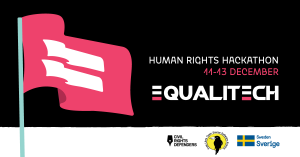- Start : 2020/12/11 18:00
- End : 2020/12/13 18:00

EqualiTECH 2020
11 – 13 December 2020
Civil Rights Defenders (CRD) and Free Libre Open Source Software Kosova (FLOSSK) are opening the call for the second regional hackathon, EqualiTECH 2020, that will deal with human rights issues. Mentored by professionals in the field of human rights activism and technology, selected individuals and groups will take part in a hackathon on 11-13 December to create their solutions. The hackathon will be held online and is open to all participants from the Western Balkans countries.
What is EqualiTECH?
EqualiTECH is a regional hackathon held in order to use the technological potential of young people in the Western Balkans for the fight against injustice and inequality. While many steps are being taken towards equal opportunities and justice in the Western Balkans, there is still a lot of work to be done for everyone to have equal access and rights and to rely on the justice system. Participants are challenged to use their knowledge and capacities as human rights advocates and activists to create technological solutions that will support human rights in the Western Balkans.
The competitors will have a full weekend to think of and discuss innovative tools that will ease the work of human rights activists and marginalized society. After the hackathon, winning groups will be awarded and will work for 6 weeks to finalize their creations.
Challenges:
After the first regional hackathon held last year, CRD and FLOSSK are organizing the second EqualiTECH hackathon focusing on the topic of Justice and Equality with a specific focus on:
1. Access to legal services for marginalized communities
Marginalized and underrepresented groups in the Western Balkans often face discrimination even when seeking basic legal services which should be easily accessible by everyone. Equal access to the judicial system is critical to inclusive development. This challenge aims to reduce gaps between people in need of legal services and those who provide those services. Participants are asked to come up with solutions that will connect public and private legal bodies responsible for providing free legal aid with individuals and groups in need of legal aid and advice.
2. Identifying friendly places for minority groups
Many places, bars, restaurants, hotels, and parks can be discriminatory against certain groups, denying some of their most fundamental rights. This challenge focuses on inclusive, and non-discriminatory public, private places, and service providers that would be particularly accessible to vulnerable and marginalized communities in the Western Balkans (e.g LGBTI+ community). This challenge aims to design a tool that would serve as a tool to ease the everyday movement of marginalized and vulnerable communities in the Western Balkans which in result would make them feel included and safe.
3. Identifying the challenges that human rights organizations are facing with access to justice during the COVID-19 pandemic
The COVID-19 pandemic has brought unprecedented challenges to organizations and governance systems in the Western Balkans. During the response to contain it, basic freedoms of movement, assembly, employment, and information have been put on hold. The aim of this challenge is to identify and create solutions for the challenges faced by human rights organizations during the pandemic such as protecting: the right to freedom of movement, the rights to work, the right to privacy and confidentiality, the right to express freely, etc
A fourth challenge will be focused on the topic of Access to Information, more specifically:
4. Addressing access to information during the COVID-19 pandemic
The spread of information has been worsened by the COVID-19 crisis in the Western Balkans. Right access to information makes it possible for citizens to follow responses to the crisis, such as rules, regulations of travel and school, virus testing, medical supplies, etc. This tool could serve to share cases in the region regarding violations of the right to information and seeking accountability from authorities. The products around this challenge should also contribute to the exchange of good practices and guidelines on the right to access information.
Awards
The call for participants will be open until December 6, after which only five teams will be selected to participate in the hackathon. During the hackathon, teams will be mentored by four professionals in the field of human rights activism and technology. Two cash prizes will be awarded for the two teams with the winning solutions, with one part of the prize being awarded at the end of the hackathon and the other part after the finalization of the creation. The prizes will be divided as follows:
First Place – 2,500€ (1,000€ + 1,500€ after the product is finalized)
Second Place – 1,500€ (700€ + 800€ after the product is finalized)
Interested candidates can apply here.
The deadline for the application is December 6, 11:59pm.
Eligibility Criteria
Human rights activists/advocates, students, programmers, designers, UX researchers and other activists with an interest in human rights solutions are invited to apply. You can apply both as an individual and as a team with no more than 4 people per team. If you think that you have a good idea for one of the challenges but you don’t have a group, there is a chance that you can pair up with other people during the hackathon. The criteria for participating are:
- All individuals must be between 18-35 years of age;
- Must work (HR activists or advocates) or have an interest (tech candidates) in combating discrimination, upholding human rights for minorities and underrepresented groups, and ensuring freedom of expression;
- Tech candidates must be skilled in using programming language or tools and/or graphic design software;
- All candidates must be able to collaborate within a team;
- Must have a passion for problem-solving and analytical thinking;
- Preference will be given to individuals with proven experience or passion in combating human rights violations;
- Candidates are encouraged to adopt open source solutions from elsewhere. Code from winning solutions will be released as open source in the spirit of helping fellow activists.
